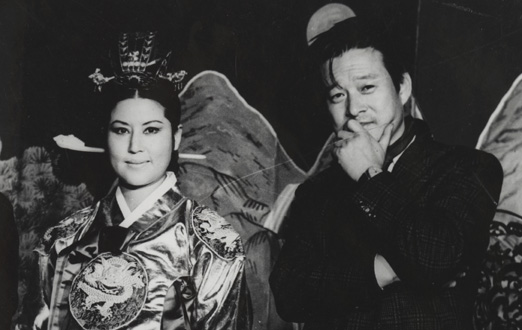Imagine you’re Kim Jong-il. You’re not only the Sun of the Communist Future but a movie buff and bored to death by the stodgy agitprop churned out by North Korea’s film studios. The solution? Abduct the king and queen of South Korean cinema, force them to make movies for you, and bring artistry and flair to your country’s cinematic endeavors.
Detailed in Paul Fischer’s 2015 page-turning book, A Kim Jong-Il Production: The Extraordinary True Story of a Kidnapped Filmmaker, His Star Actress, and a Young Dictator’s Rise to Power, the real-life 1978 kidnapping pulsed with more excitement than a thriller deserves. The story featured international intrigue, a rekindled romance, daring escape attempts, showbiz glamour, and a glimpse inside the deeply bonkers regime (and mind) of Dear Leader Kim. Such promising elements, however, struggle to come to life in Robert Cannan and Ross Adam’s subdued documentary, which outlines the events but can’t quite reach the tale’s danger and passion.
Shin Sang-ok raced to the forefront of South Korea’s movie scene in the 1950s as a driven director and producer. He fell in with wartime survivor Choi Eun-hee, who was striving to remake herself as an actress. Shin and Choi became a sort of South Korean Liz and Dick: famous, admired, and willing to take artistic risks while churning out box-office hits.
But after the couple’s fortunes faltered in the 1970s, the extravagant Shin lost his production company, dumped Choi, and had a baby with a younger woman as part of a midlife crisis. Alone and low on money, Choi flew to Hong Kong in hopes of taking an acting offer. But Kim’s abduction team lay in wait and smuggled her inside a boat across the South China Sea. While looking for Cho, Shin would also be kidnapped, imprisoned, and reunited with her at the North Korean dictator’s court, and a new and illustrious chapter in the country’s movie industry was about to begin, managed by the ultimate movie maven: Kim Jong-Il himself.
Cool and restrained, the film relies on archival footage, interviews, and retro-styled reenactments to lay out its time line. These sources don’t always communicate the panic—and weirdness—of this passing strange episode. Choi, at 89, is a queenly and dignified interviewee, but not always an emotionally revealing one. Shin died in 2006 and so cannot share his ordeal, which included severe torture and two brave attempts to break out of North Korean prison camps. Meanwhile, audiotapes the couple made of Kim’s praise and orders stall the flow of images. While voice-over narration is highly unfashionable in documentary film at the moment, here it might have added useful detail and even some edge to the storytelling.
Kim made way for Choi and Shin to spice up North Korea’s dull commie dream factory, showering the couple with resources and granting them a limited measure of artistic freedom. Not only did they delight the Supreme Leader, they enjoyed a career second wind that propelled them to film festivals in Europe, where they finally managed to defect and escape. Shin even managed to produce the “Teenage Mutant Ninja Turtles” franchise once in Los Angeles—not bad for a third and final act.
Both Choi and Shin faced down a truly bizarre predicament with guts and creativity, and you want to cheer for their survival of a crushing ordeal. The Lovers and the Despot’s defining emotion, however, is sadness—regret for years, love, and freedom lost. Not completely able to sweep us off our feet with thrills and secrecy, the film ends on a somber note, indicating that the ride may have been wild but the price was high.

















Leave A Comment